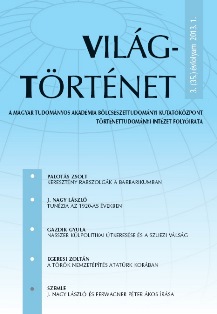Tunézia az 1920-as években. A nemzeti mozgalom születése
Tunisia in the 1920s. The Birth of the National Movement
Author(s): László J. Nagy Subject(s): History
Published by: Magyar Tudományos Akadémia Bölcsészettudományi Kutatóközpont Történettudományi Intézet
Summary/Abstract: The organizations of the Tunisian national movement were created during the 1920s. The Destour Party, the national labour union and the left-wing, communist groups gained growing importance in the political life of the country in the colonial era, and remained dominant even after it conquered its independence, in 1956. A specific feature of the Tunisian national movement compared to other political experiences in Northern Africa was the strength of the left-wing secularised trade unions, while reference to political Islam did not appear in the country’s life until recent times. The starting point of the Tunisian nationalist movement was not the Koran, but the emancipatoric ideology of the French revolution. At the same time, they defended the Islamic religion and civilization against the colonial power as part of their national consciousness. Dialogue was the basic element of the political culture of a national movement which never agreed to solve problems by using force. The strong national trade union remains the most intriguing feature of the Tunisian nationalist movement. Beyond bringing forward a radical social program, trade union leaders actively participated in the political struggle as well.
Journal: Világtörténet
- Issue Year: 2013
- Issue No: 1
- Page Range: 19-38
- Page Count: 20
- Language: Hungarian

